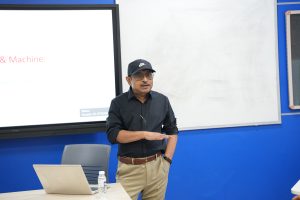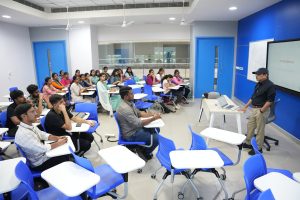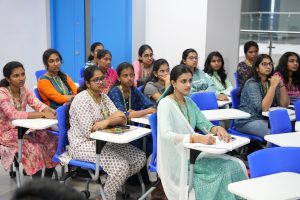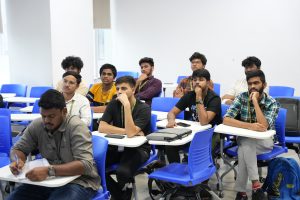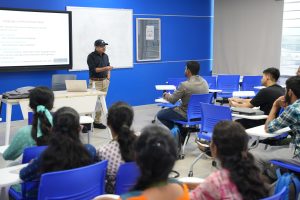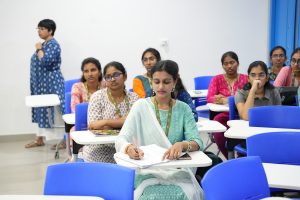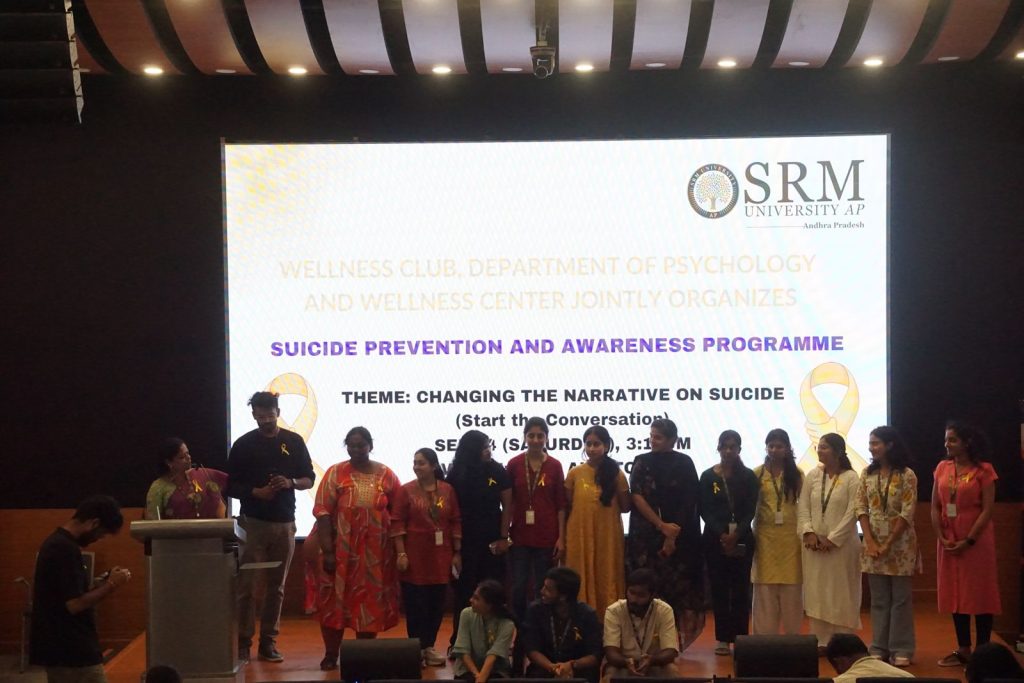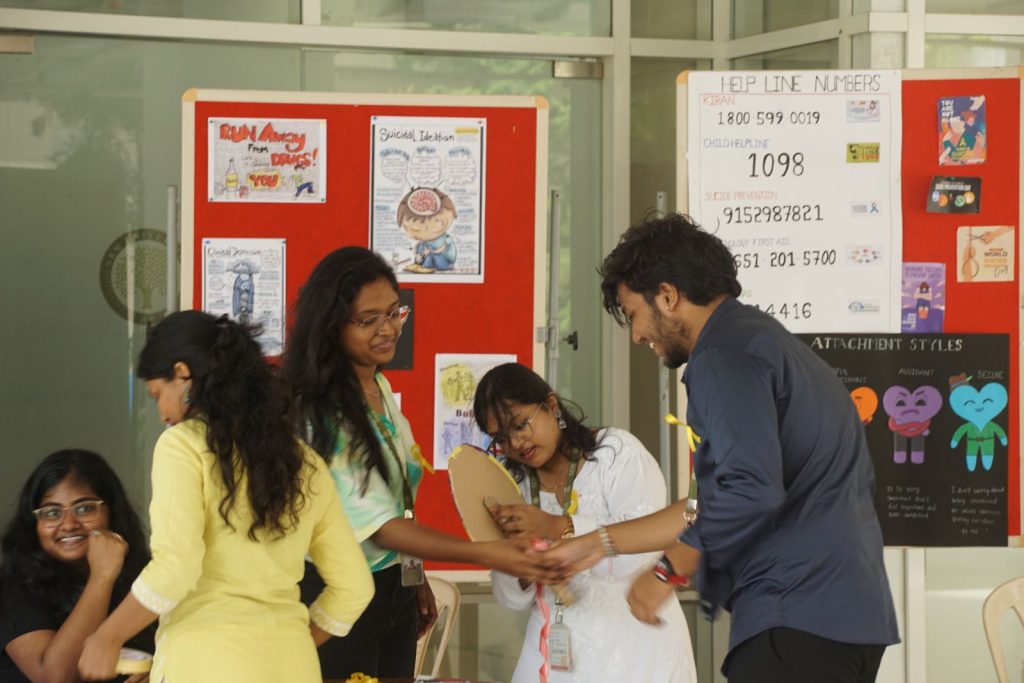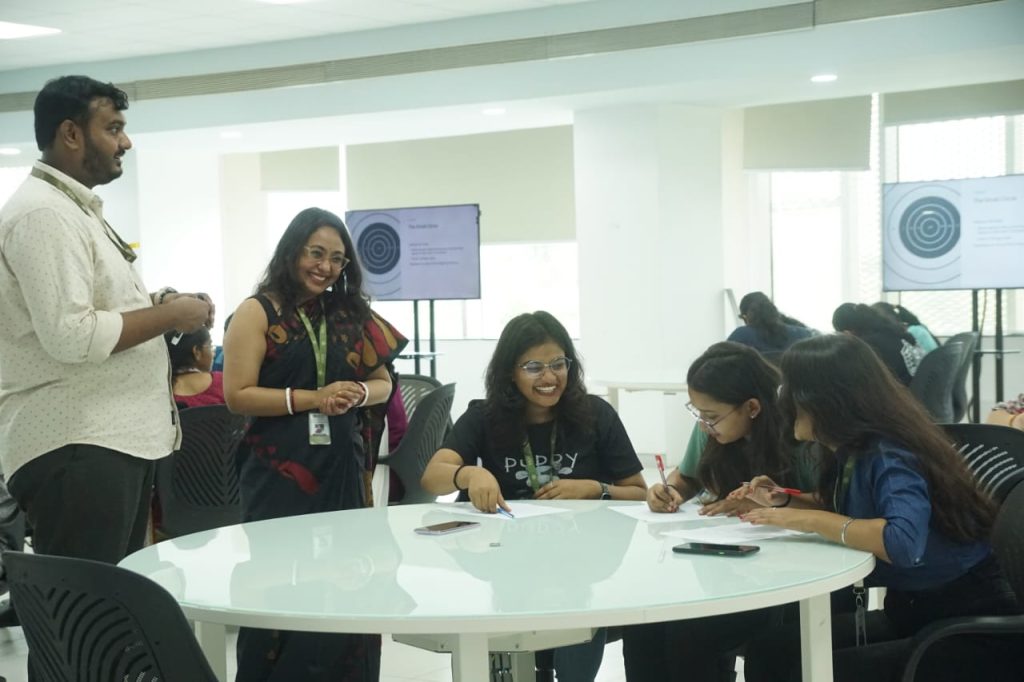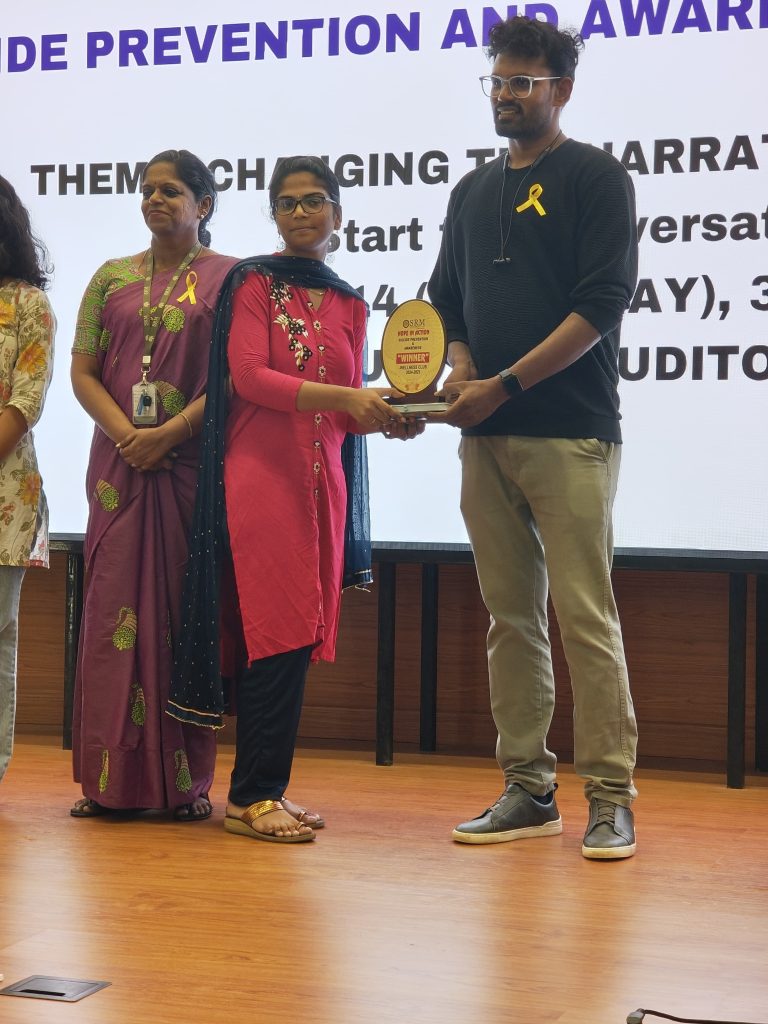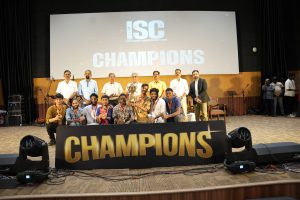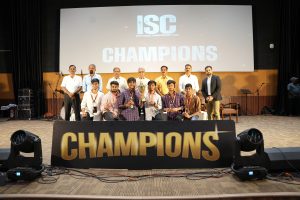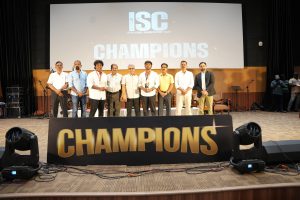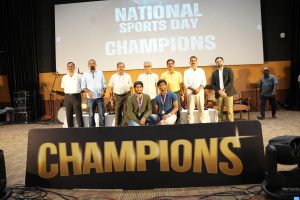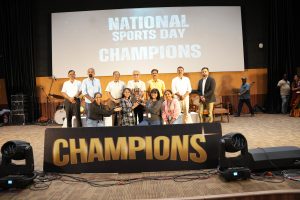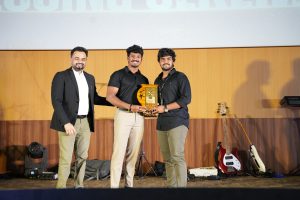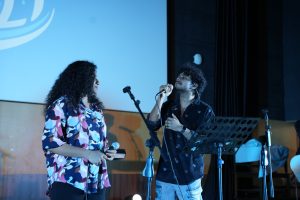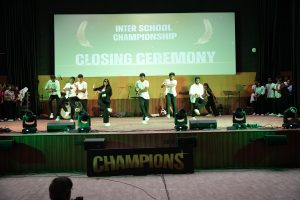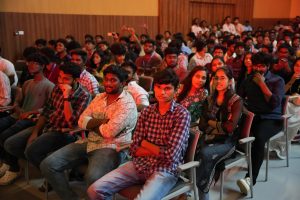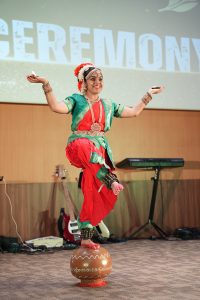Bridging Minds and Machines: A Guest Lecture on Language Processing
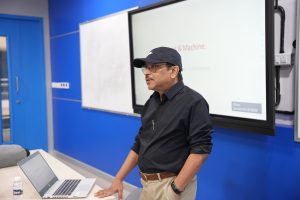 The Department of Literature & Languages hosted a guest lecture for students enrolled in the open elective course “Decoding Language,” which is based on Neuro-Linguistic Programming (NLP). The lecture took place on October 14 and 15, 2024 and featured Dr Debdarsan Niyogi, an authority in Artificial Intelligence, Machine Learning, and Generative AI.
The Department of Literature & Languages hosted a guest lecture for students enrolled in the open elective course “Decoding Language,” which is based on Neuro-Linguistic Programming (NLP). The lecture took place on October 14 and 15, 2024 and featured Dr Debdarsan Niyogi, an authority in Artificial Intelligence, Machine Learning, and Generative AI.
Dr Niyogi’s lecture, titled “Mind & Machine: How Language is Processed,” focused on the intersection of human cognition and artificial intelligence in language processing. He provided in-depth insights into how natural language processing (NLP) algorithms enable machines to interpret and generate human language. The sessions bridged the gap between human linguistic abilities and machine learning models.
Students gained valuable knowledge about the parallels between human and machine language processing. They learned about the complexities of NLP and its real-world applications in AI, data science, and machine learning. This understanding will not only enhance their grasp of neuro-linguistic programming but also prepare them for future endeavours in the growing field of AI-driven language technologies.
- Published in Departmental News, English news, News
Department of Psychology and the Wellness Centre Partner for Mental Health Awareness Programme
 The Wellness Club under the Department of Psychology, in collaboration with the Wellness Center at SRM University-AP, hosted a mental health awareness programme aimed at undergraduate students on September 14, 2024. The initiative focused on raising awareness about mental health and suicide prevention while promoting a supportive campus environment for the students.
The Wellness Club under the Department of Psychology, in collaboration with the Wellness Center at SRM University-AP, hosted a mental health awareness programme aimed at undergraduate students on September 14, 2024. The initiative focused on raising awareness about mental health and suicide prevention while promoting a supportive campus environment for the students.
University counsellors Ms Mohua Das, Ms Alekhya Sankara, and Mr Joel Kristof Gibbs played a pivotal role in the programme, leading discussions and workshops on the emotional and psychological challenges students may face. They addressed critical issues like stress management, anxiety, and crisis intervention, highlighting their extensive experience in supporting students’ mental wellness.
The programme’s objectives included reducing the stigma surrounding mental health issues, encouraging open conversations, and equipping students with tools to recognise warning signs of suicide. Interactive activities, such as the Wall of Hope and Emotional Wheel, engaged participants in expressing hope and reflecting on their emotions.
In addition to discussions, an Art Therapy Workshop provided a creative outlet for attendees, teaching grounding techniques for emotional healing. Students also showcased their creativity through poetry and digital art competitions, with themes centred on hope, resilience, and suicide prevention.
An information booth offered attendees resources on mental health support systems and coping strategies. The event concluded with a Valedictory Ceremony, where reflections on the day were shared, and prizes were awarded to competition winners.
Participants left feeling empowered and equipped with valuable tools to support their mental well-being and that of their peers. This initiative marks a significant step in SRM University-AP‘s commitment to fostering a supportive and safe environment for student mental health. As mental wellness continues to be a priority, the varsity encourages ongoing participation in mental health initiatives to further enhance awareness and support across the campus.
- Published in Departmental News, News, Psychology News, student affairs news
Prof. Mythily Ramaswamy on Exploring the Intersection of Fourier Analysis and Partial Differential Equations
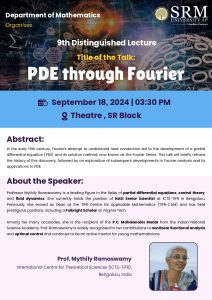 The Department of Mathematics hosted its 9th Distinguished Lecture, “PDE through Fourier” on September 18, 2024. The speaker, Prof. Mythily Ramaswamy, a renowned scholar in the fields of partial differential equations, control theory, and fluid dynamics addressed a crowd of faculty members, PhD students, MSc students, and attendees from various other Departments.
The Department of Mathematics hosted its 9th Distinguished Lecture, “PDE through Fourier” on September 18, 2024. The speaker, Prof. Mythily Ramaswamy, a renowned scholar in the fields of partial differential equations, control theory, and fluid dynamics addressed a crowd of faculty members, PhD students, MSc students, and attendees from various other Departments.
Prof. Mythily Ramaswamy’s lecture delved into the intricate development of partial differential equations (PDE) as influenced by the groundbreaking work on heat conduction by Fourier in the early 19th century. Prof. Ramaswamy, skillfully traced the history of Fourier’s discovery, leading to the formulation of the Fourier Series—a fundamental aspect of solving PDEs. She also explored modern developments in Fourier analysis and its vital applications in the realm of PDEs.
Prof. Mythily is currently serving as a NASI Senior Scientist at the International Centre for Theoretical Sciences (ICTS-TIFR) in Bengaluru, she has held significant positions such as Dean at the TIFR Centre for Applicable Mathematics. A recipient of the prestigious P C Mahalanobis Medal from the Indian National Science Academy, Prof. Ramaswamy is recognised for her substantial contributions to nonlinear functional analysis and optimal control, and she takes pride in mentoring the next generation of mathematicians.
Following the lecture, a lively 15-minute Q&A session provided attendees the opportunity to engage with Prof. Ramaswamy. Participants raised thoughtful questions, which sparked invigorating discussions on the applications of PDEs and the pivotal role of Fourier analysis in modern mathematics. The speaker’s valuable insights enriched the audience’s understanding and prompted further interest in the subject.
The event was deemed a resounding success, significantly enriching the academic experience of all participants. Both PhD students and faculty members gleaned crucial knowledge from Prof. Ramaswamy’s expertise, enhancing the intellectual atmosphere of the university. This lecture is poised to positively impact the institution’s academic reputation and foster future research collaborations. The Department of Mathematics looks forward to hosting more events that contribute to the vibrant academic community.
- Published in Departmental News, Math News, News
Dr Jaidev Kaushik Harnesses the Potential of Waste-Derived Copper Flakes
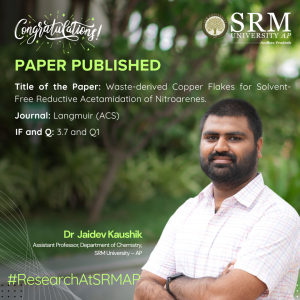 In a society where sustainability is the watchword, Dr Jaidev Kaushik, Assistant Professor at the Department of Chemistry introduces an innovative method for producing acetanilide derivatives, using waste-derived copper flakes as a catalyst. This environmentally friendly approach enables a single-step synthesis while promoting a “waste to wealth” philosophy. His paper titled, “Waste-derived Copper Flakes for Solvent-Free Reductive Acetamidation of Nitroarenes,” featured in the Q1 Journal, Langmuir (ACS).
In a society where sustainability is the watchword, Dr Jaidev Kaushik, Assistant Professor at the Department of Chemistry introduces an innovative method for producing acetanilide derivatives, using waste-derived copper flakes as a catalyst. This environmentally friendly approach enables a single-step synthesis while promoting a “waste to wealth” philosophy. His paper titled, “Waste-derived Copper Flakes for Solvent-Free Reductive Acetamidation of Nitroarenes,” featured in the Q1 Journal, Langmuir (ACS).
Abstract:
Amides are the most vital chemical moieties used in organic and biological processes and as a starting material in many industrial sectors like pharmaceuticals, agro-based, polymers, solvents, dyes, pigments, etc. The most common synthesis method of amides is by first reducing nitroarenes to their corresponding amines, followed by acylation with the required acyl group, a two-step process involving expensive metal catalysts. Given this, we have utilized waste-derived copper (Cu) flakes as a cost-effective heterogeneous catalyst for solvent-free and one-pot reductive acylation of nitroarenes. Metallic zerovalent copper flakes (f-ZCu) were isolated from waste copper Cu scrap/flakes/turnings generated after the grinding and cutting from the Cu industries. Moreover, the same procedure was also utilized to produce various substrates, including the gram-scale synthesis of the well-known crucial antipyretic drug, paracetamol.
Practical / Social Implications:
The proposed copper waste-derived heterogeneous catalyst can replace toxic and heavy metal catalysts from various organic synthesis reactions and can be utilized in the large-scale synthesis of important drugs such as paracetamol under more optimized conditions.
Collaborations:
Dr Sumit Kumar Sonkar (MNIT Jaipur, India)
Future Research Plans:
1. The adsorption/photodegradation-assisted quick and efficient removal of next-generation advanced pollutants such as microplastic, pesticides, pharmaceutical waste, etc. by hydrophobic carbon aerogel and their doped and functionalized versions.
2. Utilising waste-derived heterogeneous catalysts in organic transformation reactions.
3. Selective sensing of toxic metal ions/biomarkers/biomolecules using fluorescent nanomaterials.
4. Upcycling of carbonates/CO2 via photo/thermal assisted reactions to get C1 and C2 hydrocarbons (green fuel).

- Published in Departmental News, News, Research News
SRM AP Partners with Amaravati Drone Summit 2024
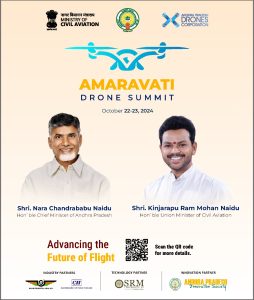 The Government of Andhra Pradesh has announced its partnership with SRM University-AP as its technology partner for the Amaravati Drone Summit 2024. The Summit will feature Union Minister of Civil Aviation, Shri. Kinjarapu Ram Mohan Naidu and the Chief Minister of Andhra Pradesh, Shri. Chandra Babu Naidu. Their presence will underscore the importance of the Summit and signal the government’s commitment to embracing new technologies that have the potential to revolutionise various sectors.
The Government of Andhra Pradesh has announced its partnership with SRM University-AP as its technology partner for the Amaravati Drone Summit 2024. The Summit will feature Union Minister of Civil Aviation, Shri. Kinjarapu Ram Mohan Naidu and the Chief Minister of Andhra Pradesh, Shri. Chandra Babu Naidu. Their presence will underscore the importance of the Summit and signal the government’s commitment to embracing new technologies that have the potential to revolutionise various sectors.
The summit will feature thought-provoking sessions by Vice Chancellor Prof. Manoj K Arora, along with other industry and academic leaders. Additionally, a dedicated exhibition aimed at showcasing solutions and addressing challenges encountered in technology operations will be featured. The Summit will also host Hackathons for students, providing them with a platform to demonstrate their skills and technological expertise. The university’s Centre for Drone Technology will take active part in mutliple sessions at the summit.
By nominating SRM University-AP as its technological partner, the Government of Andhra Pradesh is leveraging the university’s state-of-the-art research facilities and its pool of talented Faculty, researchers and students. This partnership is expected to not only provide a platform for showcasing cutting-edge drone technology but also to spur research and development in this rapidly evolving field.
The event is poised to become a landmark occasion, paving the way for new collaborations and innovations that could redefine the boundaries in the world of technology.
- Published in Civil Engg events, Departmental Events, Events
Professors Develop Fish Scale SERS Substrates for Pollutant Detection
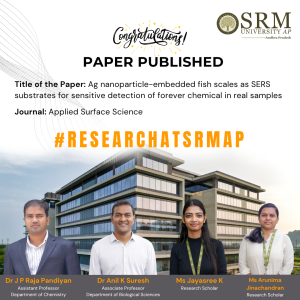 Surface-Enhanced Raman Spectroscopy (SERS), a technique that helps scientists detect tiny amounts of substances, is used for checking pollutants in our environment and the food we eat. However, using this method can be tricky because sometimes other substances can interfere. To overcome these challenges, scientists are working on better ways to prepare samples and analyse the data with a quick and easy way to find harmful pollutants called PFOSA in human urine, soil, and water using a fish scale-based substrate. This remarkable research titled, “Ag nanoparticle-embedded fish scales as SERS substrates for sensitive detection of forever chemical in real samples” by faculty members from the Department of Chemistry and Department of Biological Sciences, Dr J P Raja Pandiyan and Dr Anil K Suresh, along with their research scholars, Ms Jayasree K and Ms Arunima J, have opened up new avenues, demonstrating a significant advancement in the field of science.
Surface-Enhanced Raman Spectroscopy (SERS), a technique that helps scientists detect tiny amounts of substances, is used for checking pollutants in our environment and the food we eat. However, using this method can be tricky because sometimes other substances can interfere. To overcome these challenges, scientists are working on better ways to prepare samples and analyse the data with a quick and easy way to find harmful pollutants called PFOSA in human urine, soil, and water using a fish scale-based substrate. This remarkable research titled, “Ag nanoparticle-embedded fish scales as SERS substrates for sensitive detection of forever chemical in real samples” by faculty members from the Department of Chemistry and Department of Biological Sciences, Dr J P Raja Pandiyan and Dr Anil K Suresh, along with their research scholars, Ms Jayasree K and Ms Arunima J, have opened up new avenues, demonstrating a significant advancement in the field of science.
Abstract:
Surface-enhanced Raman spectroscopy (SERS) has emerged as one of the most promising analytical tools in recent years due to its advantageous features such as high sensitivity, specificity, ease of operation, and rapid analysis. These attributes make SERS particularly well-suited for environmental and food analysis. However, detecting target analytes in real samples using SERS faces several challenges, including matrix interference, low analyte concentrations, sample preparation complexity, and reproducibility issues. Additionally, the chemical complexity of pollutants and environmental factors can impact SERS measurements. Overcoming these hurdles demands optimised experimental conditions, refined sample preparation methods, and advanced data analysis techniques, often necessitating interdisciplinary collaborations for effective analysis. Therefore, our focus lies in the development of various methods for fabricating SERS substrates, pretreating analytes, and devising sample preparation strategies. These efforts aim to enable the detection of analytes like Perfluorooctane sulfonamide (PFOSA) – a toxic environmental pollutant within complex real samples, including human urine, lake water, and soil samples.
Practical / Social Implications:
SERS Community: Introducing a facile fabrication method for developing filter paper-based substrates, utilizing evaporation-induced self-assembly methods with the aid of 96-well plates. These substrates boast exceptional sensitivity and uniformity, exhibiting a relative standard deviation (RSD) of 8.2%. They offer easy fabrication and serve as effective SERS substrates for various applications.
Industry and Government Bodies: This invention plays a pivotal role in assessing contamination in food and water bodies, serving as a crucial tool in monitoring
environmental contamination through on-site analysis with portable instruments. It ensures adherence to regulatory standards and safeguards public health.
Research: Beyond its practical applications, the invention supports scientific research endeavours focused on identifying microplastic contaminants in real-world samples using portable Raman spectrometers. This not only aids ongoing research but also paves the way for future studies in this critical field.
Collaborations:
1. Dr Hemanth Noothalapati Raman Project Center for
Medical and Biological
Applications, Shimane
University, Matsue 690-8504,
Japan
2. Dr Murali Krishna C. Advanced Centre for
Treatment, Research and
Education in Cancer, Tata
Memorial Centre, Navi
Mumbai 410210, India
3. Dr Soma Venugopal University of Hyderabad, India
Future Research Plans:
Harnessing SERS for the Detection of Emerging Contaminants in Environmental and Food Matrices
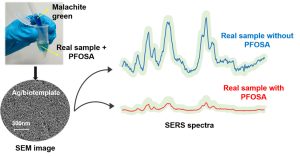
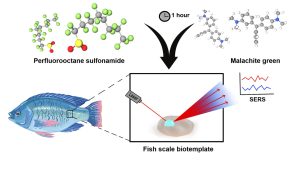
- Published in Chemistry-news, Departmental News, News, Research News
Enhancing Vehicle Security with Blockchain and Hybrid Computing
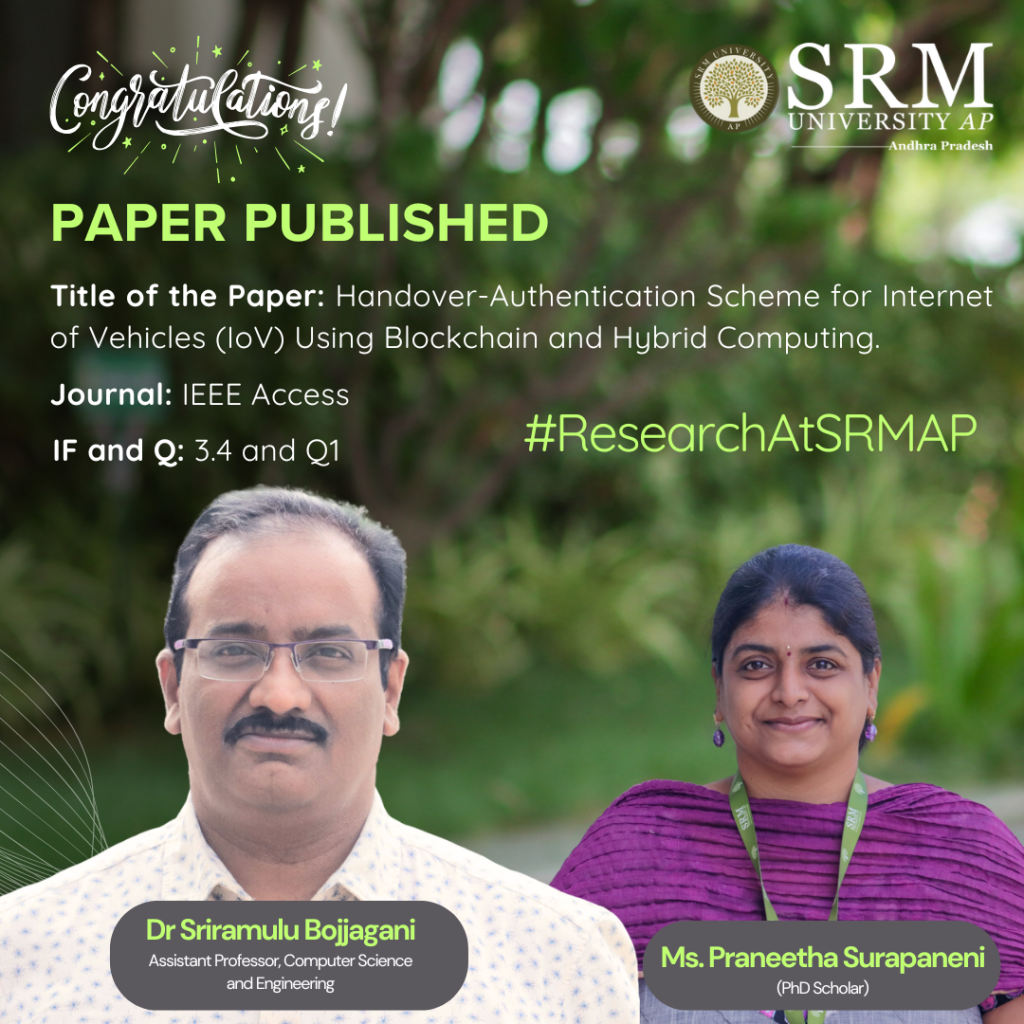 Dr Sriramulu Bojjagani, Assistant Professor, Department of Computer Science and Engineering and his research scholar, Ms Praneeta Supraneni, have proposed a secure and novel way to safeguard cars from being hacked, data breaches, and unauthorised access. Their research paper titled “Handover-Authentication Scheme for the Internet of Vehicles (IoV) using Blockchain and Hybrid Computing” will now improve transparency and traceability of your cars. Read the interesting abstract to learn more!
Dr Sriramulu Bojjagani, Assistant Professor, Department of Computer Science and Engineering and his research scholar, Ms Praneeta Supraneni, have proposed a secure and novel way to safeguard cars from being hacked, data breaches, and unauthorised access. Their research paper titled “Handover-Authentication Scheme for the Internet of Vehicles (IoV) using Blockchain and Hybrid Computing” will now improve transparency and traceability of your cars. Read the interesting abstract to learn more!
Abstract:
The advancements in telecommunications are significantly benefiting the Internet of Vehicles (IoV) in various ways. Minimal latency, faster data transfer, and reduced costs are transforming the landscape of IoV. While these advantages accompany the latest improvements, they also expand cyberspace, leading to security and privacy concerns. Vehicles rely on trusted authorities for registration and authentication processes, resulting in bottleneck issues and communication delays. Moreover, the central trusted authority and intermediate nodes raise doubts regarding transparency, traceability, and anonymity. This paper proposes a novel vehicle authentication handover framework leveraging blockchain, IPFS, and hybrid computing. The framework uses a Proof of Reputation (PoR) consensus mechanism to improve transparency and traceability and the Elliptic Curve Cryptography (ECC) cryptosystem to reduce computational delays. The suggested system assures data availability, secrecy, and integrity while maintaining minimal latency throughout the vehicle re-authentication process. Performance evaluations show the system’s scalability, with creating keys, encoding, decoding, and registration operations done rapidly. Simulation is performed using SUMO to handle vehicle mobility in IoV environment. The findings demonstrate the practicality of the proposed framework in vehicular networks, providing a reliable and trustworthy approach for IoV communication
Practical Implementation / Social Implications:
The practical application of this research can significantly improve the safety and reliability of autonomous vehicles and connected vehicle networks. By securing the handover process, it reduces the risk of hacking, data breaches, and unauthorized access, making connected vehicle systems safer for the public and contributing to the development of smart transportation infrastructures.
Future Research Plans:
Moving forward, we plan to focus on optimizing blockchain solutions for large-scale IoT and smart city applications, with a particular interest in improving consensus mechanisms and security protocols for real-time operations, such as autonomous driving and smart energy grids.

- Published in CSE NEWS, Departmental News, News, Research News
The Vision of ‘Moner Manush’ through the Lens of Dr Sayantan’s Research
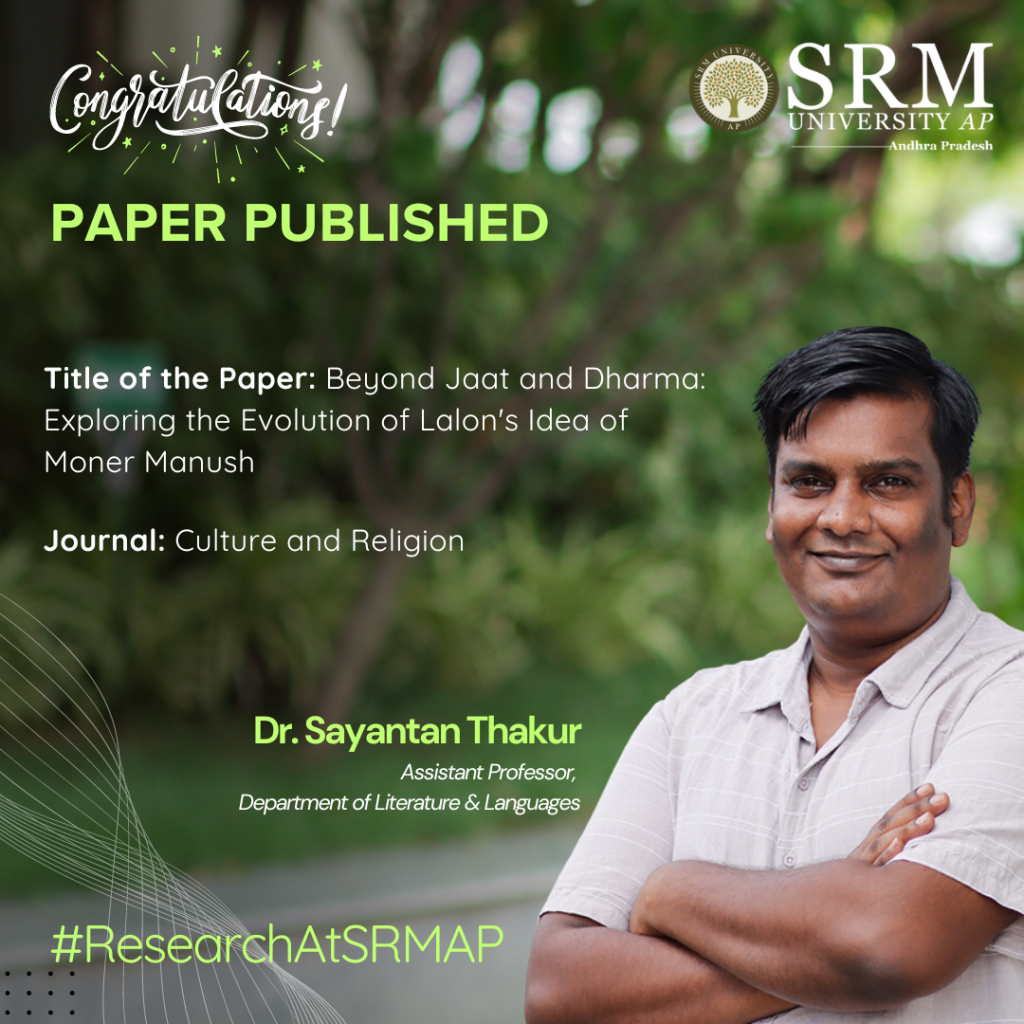
Today, we approach the topics of caste and religion with great sensitivity, aware of the deep-rooted complexities they carry. Yet, here was a character who transcended these societal boundaries, evolving into the embodiment of ‘Moner Manush’—a figure who rose above the constraints of identity to embrace a higher sense of spiritual unity and inclusiveness. Dr Sayantan Thakur, Assistant Professor at the Department of Literature and Languages closely reads into the intricacies of Lalon’s conceptualisation of man and the caste barriers in his research paper.
Abstract:
The paper entitled ‘Beyond ‘Jaat’ and Dharma: Exploring the Evolution of Lalon’s Idea of ‘Moner Manush’ delves into an in-depth exploration of Lalon’s conceptualization of ‘Moner Manush,’ transcending the conventional confines of ‘Jaat’ (caste) and Dharma (religion). Through a nuanced analysis of Lalon’s evolving perspectives, the study traces the transformative journey of the idea of ‘Moner Manush.’ By dissecting the lyrical and philosophical aspects, the paper illuminates how Lalon’s spiritual musings challenge societal norms, promoting a universal ethos that goes beyond distinctions. This inquiry aims to unravel the evolving nature of Lalon’s concept of ‘Moner Manush’ and its enduring significance in fostering inclusivity and spiritual interconnectedness, surpassing the limitations of caste and religion.
Practical Implementation and Social Implications:
The practical implementation of my research on “Beyond ‘Jaat’ and Dharma: Exploring the Evolution of Lalon’s Idea of ‘Moner Manush'” has profound social implications, particularly in fostering inclusivity and breaking down societal barriers. By promoting Lalon’s vision of transcending caste (jaat) and religious (dharma) divisions, this research advocates for a more egalitarian society where people are valued for their inner virtues, not external identities. In practical terms, this philosophy can be integrated into education, community-building, and social reform initiatives to encourage tolerance, empathy, and unity among diverse groups.
In multicultural societies, teaching Lalon’s ideas in schools and community programs can help dismantle deep-seated prejudices and promote cross-cultural understanding. Socially, the emphasis on the Moner Manush—the ideal human being—can encourage individuals to focus on self-reflection, moral development, and compassion, creating a more harmonious coexistence. Additionally, his philosophy can inform contemporary debates on identity politics, helping people prioritize human connections over rigid societal structures.
Future Research Plans
Regional Literature in Translation
Tantric Tradition and Eastern Indian Literature
Folk Music of Bengal
Indian Philosophy, Aesthetics & Literature
- Published in Departmental News, English Current Happenings, English news, News, Research News
Breakthrough in Mathematical Research: Dr Subha Sandeep Repaka’s Innovative Study on Unitary Groups
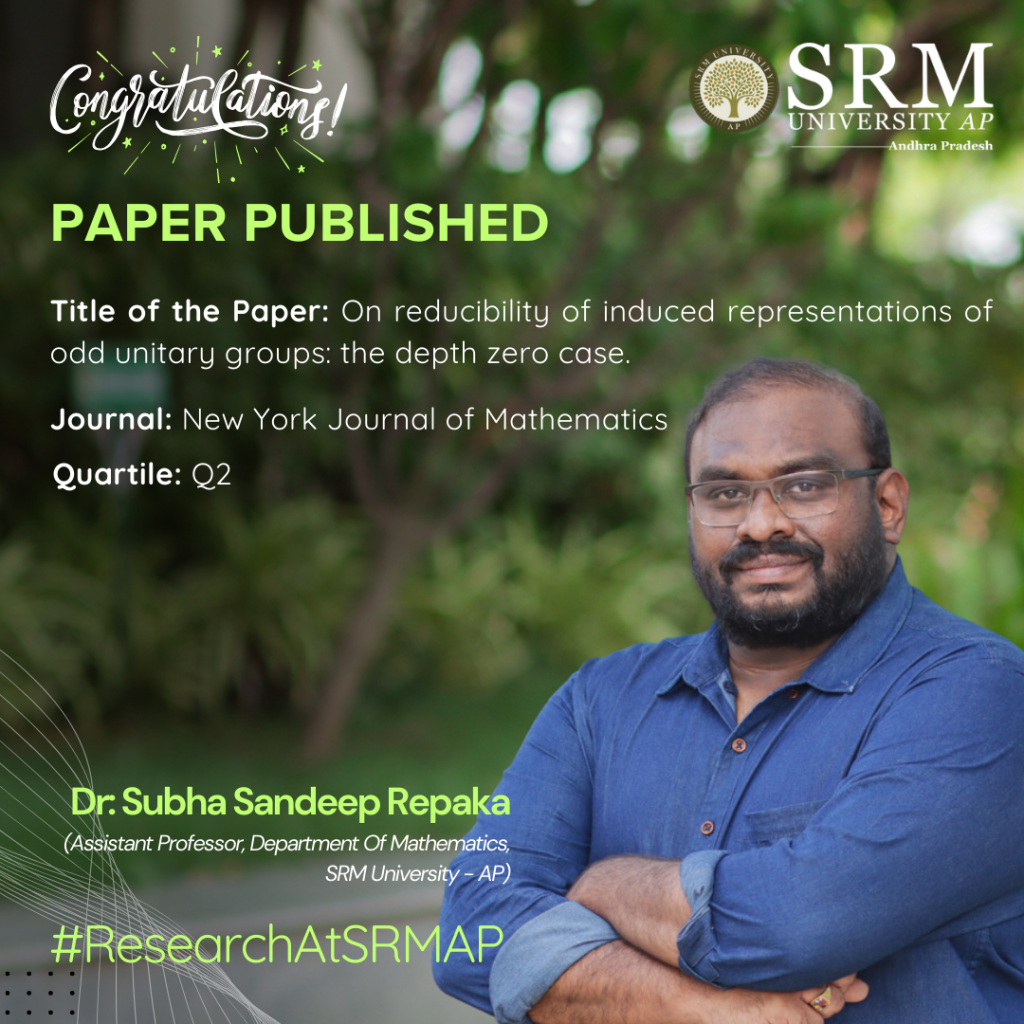
The Department of Mathematics, SRM University-AP, is pleased to announce that Assistant Professor Dr Subha Sandeep Repaka has published a significant research paper titled “On Reducibility of Induced Representations of Odd Unitary Groups: The Depth Zero Case.” This accomplishment reflects Dr Repaka’s expertise and dedication to advancing mathematical research, further enriching the academic contributions of the department and the university.
Abstract:
We study a problem concerning parabolic induction in certain $p$-adic unitary groups. More precisely, for $E/F$ a quadratic extension of $p$-adic fields the associated unitary group $G=\mathrm{U}(n,n+1)$ contains a parabolic subgroup $P$ with Levi component $L$ isomorphic to $\mathrm{GL}_n(E) \times \mathrm{U}_1(E)$. Let $\pi$ be an irreducible supercuspidal representation of $L$ of depth zero. We use Hecke algebra methods to determine when the parabolically induced representation $\iota_P^G \pi$ is reducible.
Future Research Plans:
We would like to solve the same problem which I had solved in this paper for the groups U(n,n) and U(n,n+1) over p-adic fields using L-Functions which is a very novel approach.
The link to the article:
http://nyjm.albany.edu/j/2024/30-50.html

- Published in Departmental News, Math News, News, Research News
Celebrating Sporting Excellence at Inter School Sports Championship
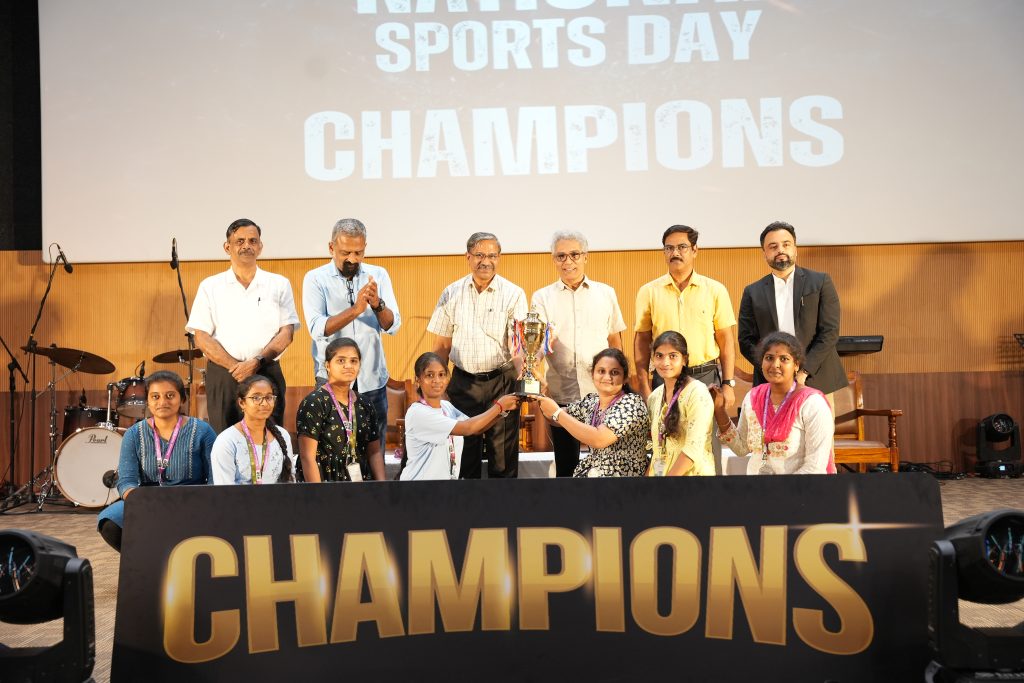 The Directorate of Sports at SRM University-AP proudly hosted the grand closing ceremony of the Inter School Sports Championship (ISC), a celebration of sportsmanship, teamwork, and dedication among students. The event, attended by esteemed guests including Chief Guest Naveen Chary, a renowned fitness influencer, Registrar Dr R Premkumar, Deans, Directors, and a vibrant crowd of students, marked the culmination of a remarkable four-week journey.
The Directorate of Sports at SRM University-AP proudly hosted the grand closing ceremony of the Inter School Sports Championship (ISC), a celebration of sportsmanship, teamwork, and dedication among students. The event, attended by esteemed guests including Chief Guest Naveen Chary, a renowned fitness influencer, Registrar Dr R Premkumar, Deans, Directors, and a vibrant crowd of students, marked the culmination of a remarkable four-week journey.
The ISC Championship witnessed the enthusiastic participation of 2,247 students from all three schools: the School of Engineering and Sciences, the Paari School of Business, and the Easwari School of Liberal Arts. Participants showcased their skills in a variety of sports, promoting camaraderie and school spirit throughout the event.
Among the games, cricket was the most popular, attracting 900 participants; Badminton followed with 482 participants and volleyball with 256 participants. The football, basketball, and chess competitions also saw enthusiastic participation, with 180, 102, and 167 players, respectively. The School of Engineering and Sciences (SEAS) emerged as the triumphant winner of the prestigious rolling trophy.
“This championship has not only highlighted our students’ athletic abilities but has also been instrumental in cultivating a culture of sportsmanship at SRM University-AP,” said Dr Dhiraj Parasher, Director of Sports, SRM University-AP. “It has opened pathways for students to consider sports as a viable career option, enriching their overall university experience.”
The closing ceremony featured an engaging live performance by Band Kadali, along with captivating classical and Western dance performances by talented students.
In his address, Registrar Dr R Premkumar reflected on the significance of the event: “As we celebrate these achievements, let us carry forward the enthusiasm and lessons learned during this championship into all our future endeavours, both in sports and academics. The friendships forged and experiences gained here will resonate within our community for years to come.”
The ISC Championship has proven to be more than just a competitive event; it has served as a platform for personal growth, team spirit, and the forging of lasting bonds among students, making it a memorable chapter in the SRM University-AP journey.
- Published in Departmental News, News, Sports News


